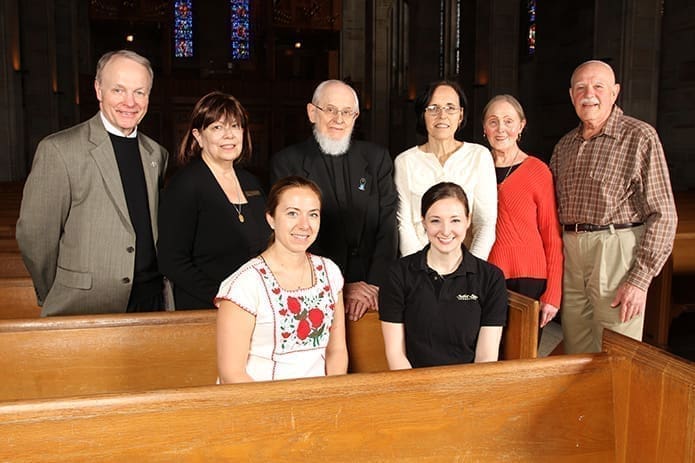 Photo By Michael Alexander
Photo By Michael Alexander Atlanta
Priest who witnessed healing speaks on Divine Mercy devotion
By ANNE NEUFELD RUTZ, Special to the Bulletin | Published April 16, 2014
ATLANTA—A priest involved in the sainthood process for St. Faustina Kowalska said he considers devotion to the Divine Mercy “the greatest grassroots movement in the entire history of the church.”
Marian Father Seraphim Michalenko spoke in March at a Cathedral of Christ the King program called “The Time for Divine Mercy Is Now.” Many Catholics associate Divine Mercy with an image of Jesus with red and white rays of light radiating from his heart, but don’t know much more about the devotion or its origins. The Cathedral event aimed to increase understanding with a full day of talks, reflections, and a one-woman play about St. Faustina.
A Polish sister belonging to the Congregation of the Sisters of Our Lady of Mercy, St. Faustina’s diary accounts of visions of Christ and revelations in which she was asked to spread this message of God’s mercy have inspired Divine Mercy devotions worldwide. She died in 1938 at the age of 33.
Father Michalenko helped promote her sainthood cause. He recalled how he accompanied an American woman, Maureen Digan of Lee, Mass., to Poland to pray at the nun’s tomb for healing from severe lymphedema. He was present when she was miraculously healed.
Digan’s healing was attributed to Sister Faustina’s intercession, leading to the nun’s beatification. He helped to coordinate efforts to verify that miracle and a second one, which made possible her canonization. For more than 20 years he was vice-postulator for North America for the canonization cause.
In 2000, Blessed Faustina was named the first saint of the new millennium by Pope John Paul II, who said the message of mercy was “tied to the history of the 20th century,” with its two world wars and the “horrible suffering of millions of people.”
“Those who remember, who were witnesses and participants in the events of those years … know how necessary the message of mercy was,” the pope said at the canonization Mass.
The pope also declared the second Sunday of Easter to be Divine Mercy Sunday. This year it will be celebrated on Sunday, April 27.
Organizers of the March 15 Cathedral program wanted to increase people’s understanding and appreciation of the message of Divine Mercy. Deacon Gerald Zukauckas, who coordinated the event, said he was very happy with what everyone learned.
“We had 20 or more parishes represented,” he said. “For those attending, I believe it was beyond their expectations. We received so many compliments.”
Besides a scholarly talk by Father Michalenko, the program featured a play developed by St. Luke Productions, with Maria Vargo in the role of Sister Faustina. The play has been presented in various cities since last October.
“The play brought that message of God’s divine mercy to life and also Faustina to life. It made her a real person,” the deacon said.
The multimedia drama combines parts of St. Faustina’s life in Poland with a modern-day story. For the actress, the role has been a challenge but also a form of ministry.
Vargo, who attends St. Monica’s Church in Santa Monica, Calif., when she isn’t on tour, said, “To play a role like this, where I believe everything I say, is awesome. It’s like sharing the Gospel.”
Although the frequent travel can be daunting, Vargo said presenting the play is vital because “the greatest attribute of God is mercy. … Our world is so broken that people need to understand the way to heal it is through God’s mercy. … The Lord comes to tell us what we need to be doing. He’s asking us to be merciful, humble and to love.”
After the play, Vargo often mingles with viewers.
“The beautiful thing is when I do this show, I have the opportunity to pray for others. And I offer the show for something particular,” she said.
“The show is about how much the Lord loves us, and he wants every soul to come to know him,” Vargo said.
The paramount importance of Divine Mercy was also the message that Father Michalenko stressed in his remarks.
Father Michalenko said, “I am convinced that this message is what the Lord told Faustina. She is to prepare the world for his final coming. The Lord told her she’d be working from heaven. And the major result is to prepare the Church for the Lord’s return.”
Father Michalenko said ordinary Catholics have embraced the Divine Mercy devotion.
“The people caught on very quickly, but the clergy are very wary and there is even some opposition,” he said.
But Father Michaelenko continues to work to promote appreciation of the devotion because its message is that Jesus is Divine Mercy Incarnate, “assuring us our sins are forgiven.”
Deacon Zukauckas said, “The people who came to the program wanted answers, and they went away fulfilled and now they have a basis to go deeper. We helped bring about 190 souls closer to Jesus and his Divine Mercy, and that absolutely gave me the most satisfaction.”
His wife, Sharon, noted how often Pope Francis refers to mercy in his public remarks.
She said, “Pope Francis wants people to understand God’s love and mercy.”
“I think it is Divine Providence that Divine Mercy is coming to the fore now,” she said. “It’s one of the most beautiful feast days we have in the Church.”